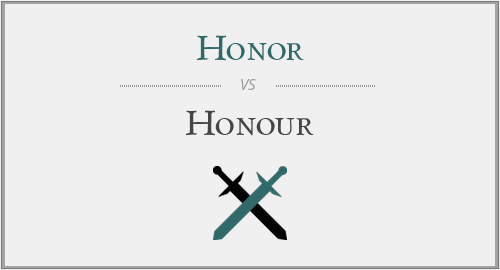Is someone close to you getting married and you need to print out the wedding card? Are you confused about the phrase Maid of Honor and wondering if it’s Maid of Honour? The difference in the spellings of honor and honour is one major confusion people face while writing pieces. Which of these spellings are actually correct and which should be used while writing formal wedding invitation?
Before considering this dilemma, let us first discuss the meaning of honor and how it is usually used in sentences and phrases.
Honor as noun:
The high respect, approbation and esteem of a person is called his honor. His name stands in the list of honor. Honor is also used to describe a person that holds and brings esteem with him. Sam is an honor to our profession. Honor is also used as a title of respect or form of address given to circuit judge or a US mayor.
The quality of a person to know and do what is morally right. He avoids any taint of dishonesty as a matter of honor. A woman’s chastity or her reputation for being chaste is also described by honor.
A privilege, or something that is rare and brings pride or opportunity is known as honor. She was honored to be invited by the Queen. A thing conferred as a distinction, especially an official award for bravery or achievement. The highest military honors are given to the bravest soldiers. A special distinction given to a student for proficiency in an examination. He passed his bachelor’s degree with honors. Honor is used as a noun in golf language describing the right of driving off first, having won the previous hole.
Honor as verb:
The similar meaning of honor is implied when it is used as a verb. To regard someone with great respect and esteem. She has learned to honor her father’s memory. To pay a public respect to someone is called honor. Talented actors were honored at the Emmy’s Award ceremony. When a person fulfils the obligations and keeps the agreement. Make sure the franchisees honor the terms of the contract. To pay a due cheque or accept a bill when it is due is called honor.
Now that you know the different meanings of honor, let’s discuss the two alternative spellings of the word. It can be spelled without the u as honor, or with the u as honour. Both the spellings are correct and the distinction is the result of differences in the American English and British English.

Honor:
The American way of writing honor is without the u, following their famous lexicographer’s instructions; remove all the unnecessary letters from a word. This leads to the short word honor that has slightly different spellings than the original word honour.
Honour:
In British English, honour is written with a u after the second vowel o. making it the long version that is widely used in British and the rest of the English speaking world except America.
Derivatives of honor:
The distinction in the spellings extends to most derivatives of the word, including honored/honoured, honoring/honouring, honorable/honourable, and honoree/honouree. But there are exceptions: throughout the English-speaking world, honorific—meaning showing or conferring respect—is spelled without the u, and so are honorary and honorarium.
Honor or Honour:
In a nutshell, you should know that honor and honour are both alternative spellings of the same word and are both acceptable in all the English speaking world. In America, honor without u is preferably used while in the rest of the world honour is preferred. So you can print your wedding invites with Maid of Honor or Maid of honour depending on your location.




Have a discussion about this article with the community:
Report Comment
We're doing our best to make sure our content is useful, accurate and safe.
If by any chance you spot an inappropriate comment while navigating through our website please use this form to let us know, and we'll take care of it shortly.
Attachment
You need to be logged in to favorite.
Log In